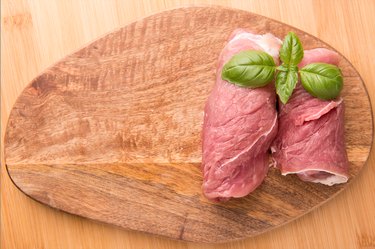
Lamb rumps aren't tough like most other meat taken from the hind end of an animal, so they don't need to be tenderized or cooked low and slow. Lamb rumps, the British nomenclature for the meat between the tenderloin and leg, correspond with sirloins in the American market.
As such, this versatile lamb cuts like a rump respond well to both short bursts of heat and long braising. Whether you cook your lamb steak recipe for a few minutes on the grill or a few hours in the oven, you get the same tenderness every time.
Video of the Day
Video of the Day
Read more: Is Lamb Meat Healthy?
Lamb Rump Seared and Roasted
Step 1: Bring to Room Temperature
Take the lamb rump out about 30 minutes before you want to start cooking and let it sit at room temperature. Pat the rump dry with paper towels and season it to taste with kosher salt and freshly ground black pepper.
Step 2: Preheat Oven and Stove
Heat the oven to 350 degrees Fahrenheit. Heat a couple tablespoons of oil, or oil and butter on the stove in an oven-safe pan. Use medium-high heat on the stove.
If you're watching your saturated fat intake, as recommended by Mayo Clinic, skip the butter.
Step 3: Sear Your Lamb
Sear the lamb rump skin-side down until the skin starts to curl at the edges, about 2 to 3 minutes. Turn the lamb rump and sear another 2 to 3 minutes.
Step 4: Bake and Rest
Transfer the pan to the oven. Roast the rump for 10 minutes for medium-rare and 12 minutes for medium. Take the pan from the oven and set the rump on a plate to rest for 5 or 10 minutes.
Step 5: Drain and Add Aromatics
Drain the all the fat from the pan except about 1 tablespoon and return it to the stove if you want to make a quick pan sauce. Saute minced aromatics, such as shallots and garlic, with a tablespoon or so of flour until browned.
Step 6: Boil Some Stock
Deglaze the pan with a scant pouring of dry wine and add about a cup or so of stock. Bring the stock to a boil and cook until thickened, about 5 minutes.
Step 7: Slice and Serve
Slice the lamb rump across the grain into 1/4- to 1/2-inch-thick slices.
Check the internal temperature of your lamb before serving. According to the Academy of Nutrition and Dietetics, the minimum temperature for safe consumption of lamb is 145 degrees Fahrenheit. Lamb also needs to rest for three minutes prior to serving.
Spoon the pan sauce over the sliced lamb and serve.
Try Lamb Cuts Stewed
Step 1: Slice and Season
Slice the lamb rump into 3/4- to 1-inch cubes and season them to taste with kosher salt and freshly ground black pepper. Dredge the lamb cubes in flour.
Step 2: Brown the Meat
Set the oven to 450 F. Heat a few tablespoons of oil in a Dutch oven on the stove over medium heat. Sear the lamb in batches until browned all over, about 5 minutes per batch, then transfer it to a plate.
Step 3: Cook Your Veggies
Saute a mirepoix, or chopped onions, carrots and celery, with some garlic until lightly colored, about 5 minutes. Add a little more oil if needed.
Step 4: Add Some Liquid
Add 2 or 3 tablespoons of all-purpose flour to the mix and cook until you smell a nutty aroma. Add 1 part dry red wine and 2 parts stock or water to the Dutch oven. You need about 2 cups of liquid total for each lamb rump.
Step 5: Simmer Your Aromatics
Add aromatics, such as bay leaves, thyme sprigs and black peppercorns, and return the lamb to the Dutch oven. Cover the Dutch oven with the lid and bring it to a simmer. Place the Dutch oven in the conventional oven.
Step 6: Add Some Starch
Add a starch, such as diced parsnips or potatoes, to the stew after 30 minutes in the oven, if desired.
Step 7: Stew and Serve
Stew the lamb rump until the starchy vegetables cook through. Serve immediately or store up to 2 days in the refrigerator.
Read more: Lamb Chops with Mint Sauce and Mushrooms
Grill Lamb Rump
Step 1: Marinate Your Meat
Marinate the rump for a couple hours before you want to grill it, if desired. You don't have to worry about tenderizing the lamb, just focus on flavor. Yogurt-based marinades work well with lamb cuts.
In addition to added flavor, marinating meat prior to grilling also helps limit formation of potential carcinogens during grilling, according to Harvard Health Publishing.
Step 2: Remove from Refrigerator
Set the lamb rump out about 15 minutes before you set up the grill. Wipe off the excess marinade.
Step 3: Heat the Grill
Set up your grill for moderately high direct heat. If you have a gas grill, set the burners to medium-high. If you have charcoal, use an even layer of charcoal in the charcoal tray.
Step 4: Season and Coat
Season the lamb rump to taste and coat it with oil. Lay the rump on the grill.
Step 5: Grill Each Side
Grill lamb rump on each side to your desired level of doneness. Transfer the lamb to a carving board.
Step 6: Rest, Slice and Serve
Let lamb rump rest about 5 minutes before slicing. Slice the lamb rump across the grain into 1/4- to 1/2-inch-thick slices and serve.